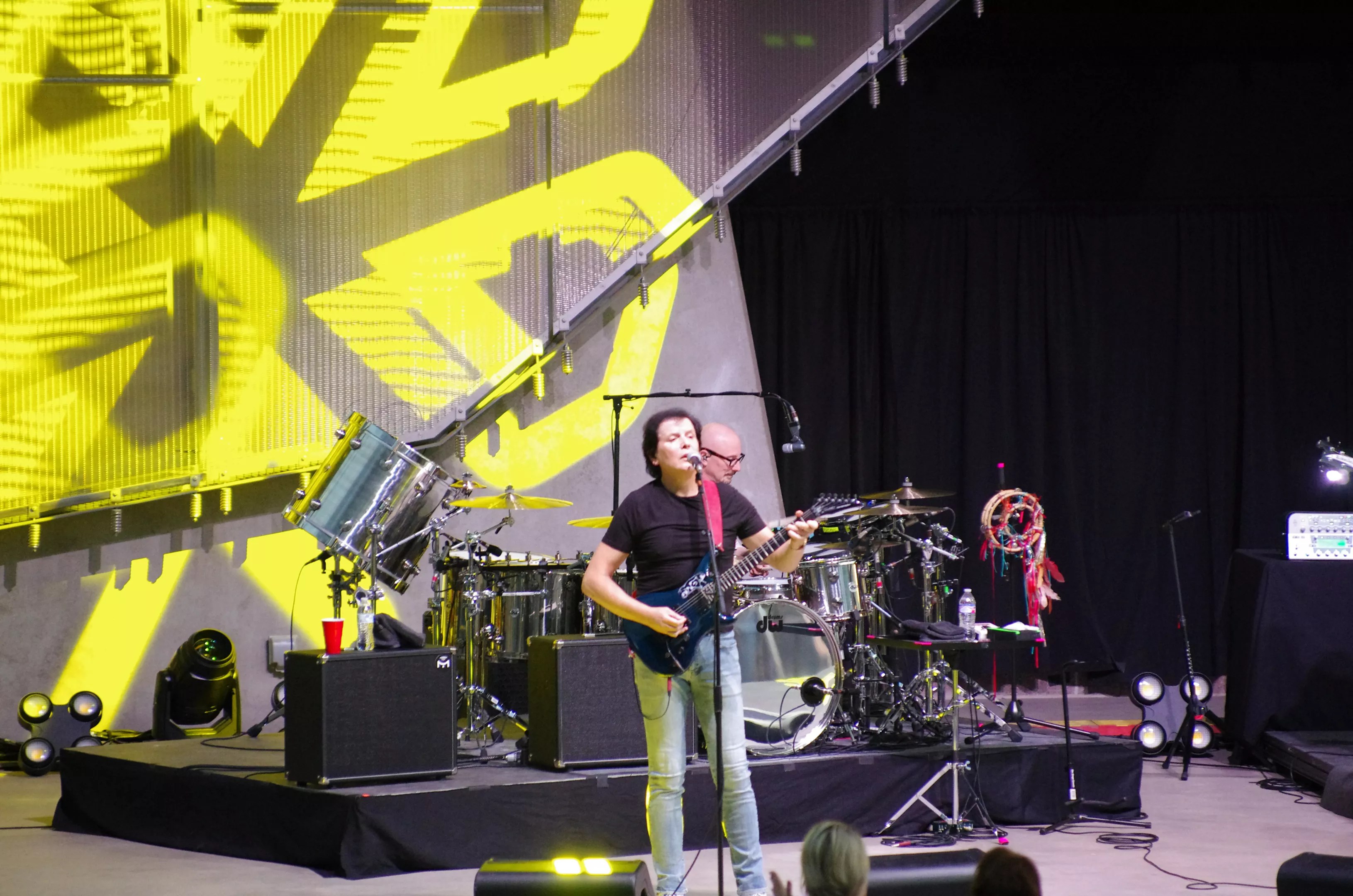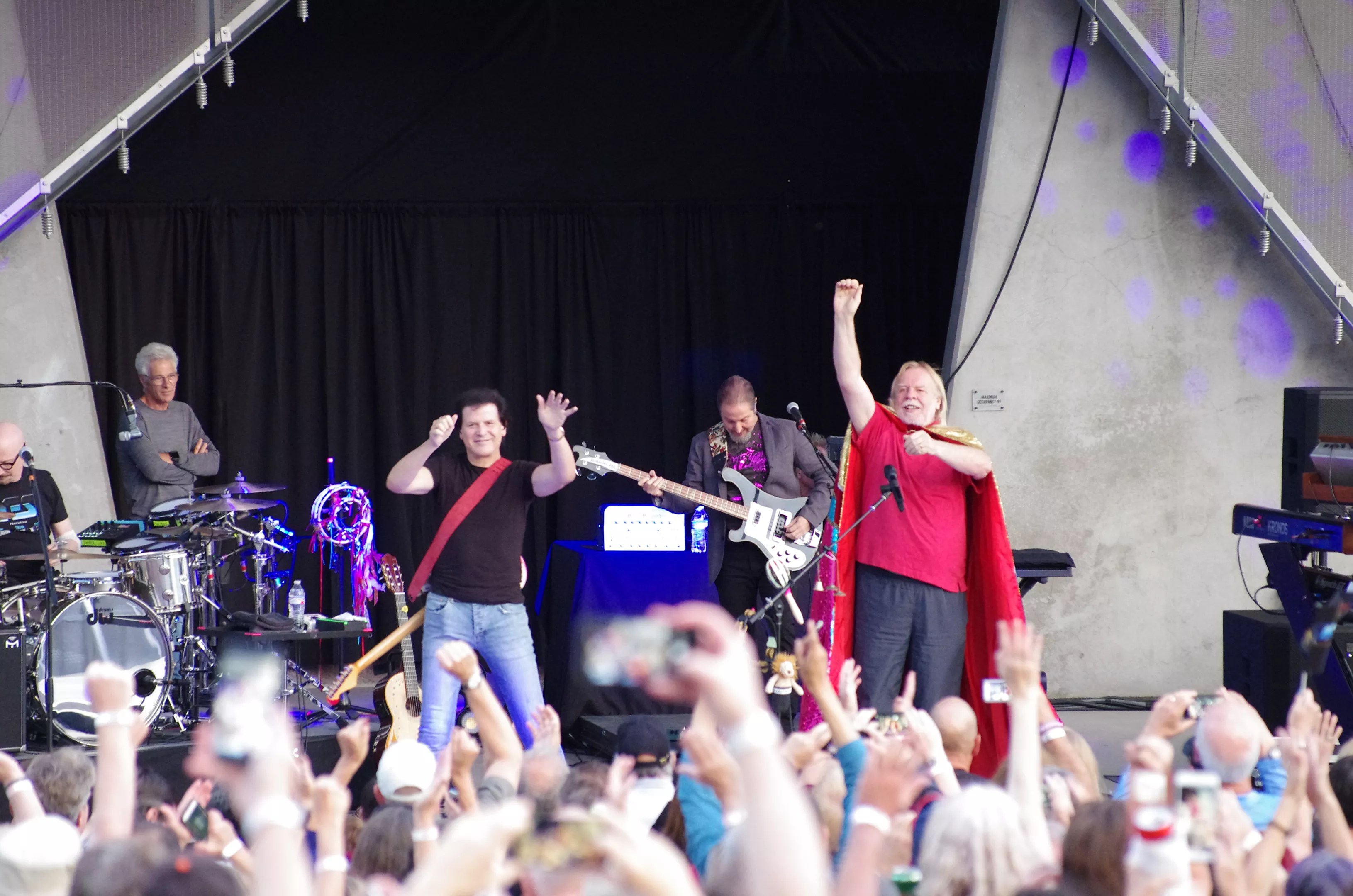
Chris Callaway

Audio By Carbonatix
Yes Featuring Anderson, Rabin, Wakeman‘s tour stop at Levitt Pavilion Denver on Labor Day was a melding of generations and cause for celebration among those Coloradans who prize the proggier side of rock.
In the crowd there was a Moody Blues T-shirt, freshly washed Gentle Giant garb and plenty of pot to go around. A father stood with his jam-rock-cultivated sons, ready to introduce some of the music that started it all. A group of women salivated, having waited over twenty years to see and hear Trevor Rabin’s well-sharpened guitar skills. Folks roared at the inclusion of some lengthy, hard-to-penetrate – but celebrated – prog pieces. And who can forget the person tasked with explaining to folks who purchased front row center tickets that a “VIP” needed the seats – a VIP none other than vocalist Jon Anderson’s wife, Jane.
It can be argued that Yes Featuring Anderson, Rabin, Wakeman is the “real” Yes. While the version with longtime Yes alums guitarist Steve Howe and drummer Alan White uses the name Yes without any additional identifiers, neither Howe nor White is a founding member. The British prog rockers already had a career by the time Howe and White entered the picture.
Not to take away from the impact that both musicians had on Yes – especially Howe’s celebrated guitar work -but it doesn’t make sense from a historical perspective for that band to claim the name. All it does is confuse fans. And Anderson is the sticking point: He co-founded Yes with the influential late bassist Chris Squire in 1969. At Levitt Pavilion, Anderson was the biggest draw; after all, he is the voice of Yes. At 74, he pulled off the role and did not disappoint.

Trevor Rabin
Chris Callaway
A quick instrumental piece launched the evening, with bassist Lee Pomeroy and drummer Louis Molino III taking their places. Anderson, along with Rabin and keyboard wizard, Rick Wakeman, made their way to the stage. Strangely enough, for a band whose legacy is largely steeped in odd time signatures and dizzying leads, the five-piece started things off with “Hold On,” from 90125, the album that introduced Trevor Rabin to Yes fans and made the musicians ’80s radio-rock darlings.
Anderson’s voice continued to shine as the band launched into part one of “I’ve Seen All Good People,” the mellow, wistful “Your Move” and part two of “All Good People,” with its propulsive energy and intricacy. It’s a Yes staple that showed pop elements and radio-friendliness at a time in the group’s history when those elements were much more obscure. Wakeman, draped in a full-length King Arthur-like robe and surrounded by an immense array of seven keyboard instruments, seemed to enjoy the change of pace; it was more fitting to the musical output he is known for during his times in Yes.
Rabin took over lead vocals on “Changes,” another classic from 90125. His voice handled the task well, and the tone of his guitar was staggering. It rang with the classic Roland Jazz Chorus guitar amp sound that marked so many iconic early-’80s hits, but his was even more pure and resounding.
“Rhythm of Love,” from 1987’s Big Generator, followed, and the band successfully re-created the layered, intricate vocal intro; this was certainly not an easy feat.
As natural light faded and stage lights became necessary, the quintet continued to play off each other. Wakeman became more noticeable with his keyboard parts, at one point playing a solo that was dizzying to absorb because of its speed, complexity and immensity. Rabin unleashed lightning-fast guitar riffs. Anderson remained the appreciative, soft-spoken frontman with a voice that, with very few distinctions, has stood the test of time with plenty of tone and power. Wakeman and Rabin seemed to be sharing private jokes with glances and smiles; Lee Pomeroy and Louis Molino III had the time of their lives as Pomeroy expertly played Chris Squire’s complex bass parts – with Rickenbacker basses, to boot – and Molino III re-creating the percussive demands in songs originally handled by drumming legends Bill Bruford and Alan White.
Some straight-ahead tunes were treated to extended jams by the five-piece, and other more intense compositions, such as “Heart of the Sunrise,” Yes’s 1971 prog masterpiece, were executed with power and precision, with an appreciative audience giving back plenty of praise.

Yes Featuring Anderson, Rabin, Wakeman
Chris Callaway
“Owner of a Lonely Heart” was performed, as would be expected; after all, Yes Featuring Anderson, Rabin, Wakeman didn’t want a riot to ensue. The guitar tone this time around was grittier, and some of the tune’s polish was stripped away to give it more of a rough-and-tumble feel. The band extended the song, jamming on the famous riff; mid-song Wakeman and Rabin took off into the audience, Wakeman with his ’80s-style keytar – a keyboard that straps onto the body like a guitar – and Rabin with his guitar. The crowd went wild, with fans snapping cell phone pictures and trying to catch a look. How did Wakeman not trip over his immense robe?
At some point in the show, the band launched into Cream’s classic “Sunshine of Your Love.” It was a surprise for an outfit that has a huge catalogue of tunes, but not surprisingly, the song was re-created expertly. At another point in the show, Anderson played a harp; again, this wasn’t predictable, but it worked exceedingly well with the intricate piece Wakeman was performing.
As the concert came to a close with the classic “Roundabout,” I was still trying to figure out if “Love Will Find a Way” would somehow miraculously see the light of day. Perhaps it’s the most pop of Yes’s more pop years, and it’s such a well-constructed song. But it was not to be. Still, the band could do worse than end with “Roundabout,” not exactly a bad song in any fashion.